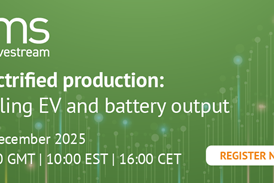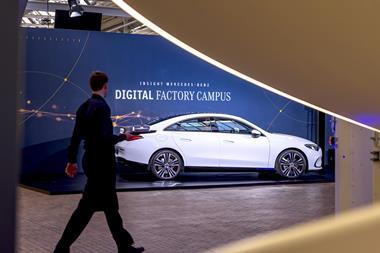
The automotive paintshop world has many mature paintshop installations that will not be replaced but can have their carbon footprint greatly reduced by intelligent energy management
Modern paint shop operations are as unique as they are complex; there is no uniform design, no absolute standard and no single solution. Not only is there a wide variety of industrial painting systems and technologies available, there are multiple philosophies regarding “best practices”. What is generally agreed upon, however, is that paint finishing operations, and spray booths in particular, consume a great deal of energy – especially within large-volume operations and particularly within the automotive industry. Not only does the painting process tend to consume the majority of energy required for the entire process, historically speaking more than 50% of the energy used to manufacture an automobile is consumed by the spray booths. This is why improving energy consumption within the paint shop has become a formidable challenge for today’s high-volume operations.
COMAU, a worldwide leader in industrial automation with significant experience in paint finishing operations, is now deeply involved in developing highly efficient processautomation solutions that reduce energy consumption and lower carbon emissions for today’s fast-paced industries. The strength of its eCOMAU division lies in developing value-for-money solutions (Green-Fit) that increase performance while lowering overall environmental impact to ensure short or medium-term payback. This includes engineering modifications and turnkey solutions for existing processes that are designed to increase energy efficiency and produce immediate, tangible energy savings results. With this approach eCOMAU enables its clients optimize their paint finishing operations without the need to completely rework the installed infrastructure.
Minimizing cost, maximising ROI
To better understand the power of how eCOMAU can optimize an existing paint shop process, one can consider the leading source of energy consumption within the process chain. While each of the related sub-processes requires energy, spray booths are the most complex and most costly in terms of overall energy consumption. Additional costs are derived from ensuring the proper setup and adjustment of a variety of parameters including humidity and temperature, for the air treatment. One of the more effective methods for reducing energy usage within spray booths is to recycle process air during the heating and cooling phases. By recirculating exhausted air from the spray booth back into the paint booth, eCOMAU can significantly reduce the amount of new air that must be fully conditioned (heating, cooling, humidification, dehumidification). Depending on the conditions, the level of solvents and on the plant layout, heat can also be recovered using an air/air heat exchanger. This form of energy optimization, in which we are able to recuperate and reutilize a part of the extracted air, is not limited to the spray booths. It can be applied to drying chambers, working decks and finishing lines, thereby delivering both savings on heating power during the winter months, and cooling capacity savings, wherever the process requires it, during the hottest periods of the year. A handful of commercially available spray booths now feature energy reduction technologies to lower the consumption that the painting process inherently demands. These technologies can offer a valid alternative for new lines, or when it becomes time to replace the existing infrastructure, but deploying such a solution can be extremely costly. As a result, few large-scale manufacturers are willing to substitute their installed equipment based solely on an anticipated energy saving; it simply does not make economic sense. The unique advantage of eCOMAU is its ability to design and implement cost-effective process modifications within existing infrastructures in order to capture significant energy and cost benefits without necessarily replacing legacy systems. The company is often able to help its clients minimize their investment outlay and maximize their overall ROI. This is because eCOMAU is in the business of designing solutions that are optimized for each individual plant and take into consideration existing and estimated future manufacturing cycle requirements.
Software solutions
The fundamental benefit of what eCOMAU proposes is the method in which it approaches each individual project; a method whereby it analyses the perceived problems and creates tailored solutions that are measured against the actual operating needs of the plant. In evaluating solutions that would help a large automaker lower costs and energy use, it determined that the investment required to alter a part of the system was not cost effective based on the productivity needs and expected overall energy savings. The ideal solution was a “stand-by” control system that could be applied to the entire paint line and would be less invasive for the existing plant. This technology, which can save tens of thousands of Euros a year in pure energy costs, leverages production gaps that can occur during the painting process when effective production is lower than the nominal capacity of the plant, in order to force the system into stand-by mode when not in use. By implementing process improvements at an operational level and not an equipment level, the estimated ROI is generally between two and three years with no immediate need to retrofit the paint line.
Software solutions
eCOMAU was recently asked to evaluate a highperformance trigeneration solution that would localize the production of energy and heat transfer fluids utilizing highefficiency systems as defined by the local energy authority agency. As part of the project it conducted a comparative economic analysis of the different possible solutions, with a particular focus on the management costs. Using specific software it is able to estimate the anticipated consumption of different technical solutions for future plant or plant modifications and in doing so helps its clients choose a technology solution that delivers increased performance and sustainability. eCOMAU’s consultancy services can therefore help clients better understand the overall costs and benefits of proposed infrastructure modifications. Taking into account energy savings and ROI, it can also help prioritize intervention options based on in-depth analysis even if it wasn't involved in the initial project.
Another way in which eCOMAU helps ensure overall energy efficiency within paint shop operations is through its innovative performance and energy control system. eCOMAU is developing a powerful software solution that seamlessly interfaces with the plant infrastructure to automatically monitor energy consumption and its relative costs, through an auto-learning algorithm that helps determine if the plant is fully eco-efficient. In addition to consumption and cost reports, which can be viewed remotely 24/7 via the Internet, system alerts are generated whenever there are anomalies or excess consumption at the stabilized measuring points. These alerts are sent via email or SMS to speed notification and preventive maintenance, and all monitored data can be visualized on an hourly, daily, monthly or annual basis. eCOMAU’s comprehensive approach to production plant optimization begins with a thorough assessment of the entire process, including power and consumption measurements, after which its green engineering team designs an intervention strategy that is based on both performance and payback analysis. By retro-fitting existing processes for increased sustainability or 'green-fitting', in the language of eCOMAU, its clients can meet best practice energy objectives in a cost-effective manner while limiting the consequences on production flows and without the need to completely rework the industrial processes already in place.



































